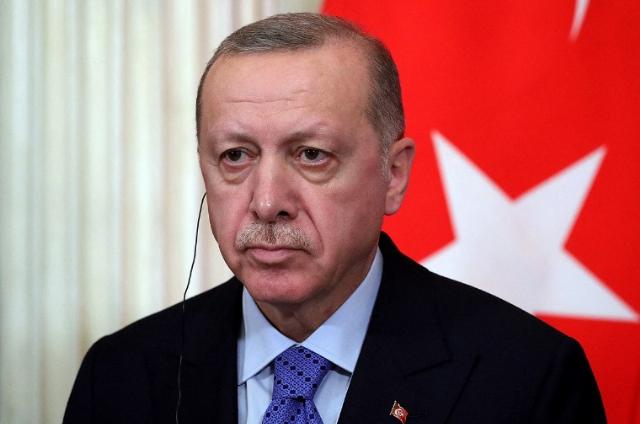Will Erdoğan build a Sunni crescent next door to Israel?
Under normal circumstances, the demise of Syria’s dictator, Bashar Assad, would have brought Ankara and Jerusalem closer, given their mutual interest in the fall of Assad and the removal of the Iranian presence and influence in Syria. Israel was, in fact, a catalyst that enabled the rebel groups, led by Abu Mohammad al-Julani, to take Damascus. The Israel Defense Forces (IDF) degraded Hezb’allah and weakened the Islamic Republic of Iran, which made Assad’s army incapable of fighting the rebels without the support from Iran, Hezb’allah, and the Russians (who moved their forces out of Syria to fight in Ukraine). Julani was therefore able to march into Damascus virtually unopposed.
Israel and Turkey, however, are currently in the midst of one of their most bitter crises in their recent history.
As an Islamist, and a leading figure in the Muslim Brotherhood movement, president of Turkey Recep Tayyip Erdoğan, is committed more to his Islamist ideology than to a realistic policy that seeks the betterment of Turkey’s population. Erdoğan’s abusive behavior toward Israel began at the Davos conference in February 2009, when he lashed out at Shimon Peres, Israel’s president, for launching the 2008–09 Operation Cast Lead against Hamas in Gaza. A year later, Turkey dispatched a flotilla led by the Navi Marmara to breach the Israeli blockade of Hamas terrorists in Gaza.
Israel’s 2023 Iron Swords war, launched in response to Hamas’s unprovoked attack on Israel with the massacre of 1,200 — mostly Israelis and civilians, and the kidnapping of 251 Israelis as hostages in Gaza tunnels — engendered a vicious and antisemitic reaction from Erdoğan. He has rallied the Muslim world to wage war on Israel, and Turkey has been active in denouncing Israel in international forums. Perhaps the one thing that no one expected to happen was Erdoğan’s decision to sever trade and commercial relations between the two countries — especially given Turkey’s economic troubles.
Erdoğan’s ambitions are grandiose. He believes himself to be something of a caliph and sultan of the believers — in other words, the leader of the Sunni Muslim world. And, in Syria under Turkey’s control, he sees the beginning of the Neo-Ottoman Empire. Jerusalem views the rebels, including Julani’s Hayat Tahrir al-Sham (HTS), as agents of Erdoğan, who funded them, armed them, and is using them as his new proxies in Syria. Erdoğan might also demand military bases in Syria.
For many in Israel, Turkey might become a “new Iran” by forming a “Sunni crescent” that would replace the “Shiite crescent” led by Iran. Such a Sunni crescent might eventually include Jordan. Israel must prepare itself for such a scenario — a virtual border with Turkey in Syria. At the same time, we cannot and mustn’t exaggerate the threat from Turkey.
Turkey is a member of NATO and, seemingly, part of the Western alliance. Erdoğan has a relationship with President-Elect Donald Trump. In fact, Trump called Erdoğan “my friend.” Also, as far as we know, Turkey is not developing nuclear weapons. Hence, Turkey is not yet akin to the Islamic Republic of Iran. Turkey also differs from Iran, at least currently, in that there are no Turkish personnel in Syria. While Turkey, under Erdoğan, is not exactly a Western democracy, and is more open than Iran, its leader is certainly an authoritarian figure. Finally, Turkey, despite its provocative anti-Israel stance and antisemitic statements, maintains political relations with Israel, although at a low level.
It is hard to imagine what kind of Erdoğan will emerge during the Trump presidency. Should Erdoğan be allowed military bases in Syria, next to Israel, an explosive situation might erupt. Israel’s support for the Kurds and its call for Kurdish independence irk Erdoğan. Members of the Turkish air force along with proxy forces of the National Syrian Army (NSA) have killed hundreds of Kurdish fighters and civilians. Erdoğan’s lavish support of Hamas, a fellow Muslim Brotherhood branch, will keep relations with Israel tense, if not more volatile.
Erdoğan seeks to secure a new term in office in 2028, which would be impossible under the current constitution. He needs the Kurdish representatives in the Turkish parliament to amend the constitution for him to run and be re-elected. About 20% of Turkey’s population is Kurdish. Erdoğan is therefore seeking to improve his relationship with the Kurdish representatives in Turkey’s parliament. Similarly, although Erdoğan’s relations with Israel are currently in a deep freeze and may stay that way as long as the war in Gaza continues, he is known to make sudden, sharp political turns.
Erdoğan’s and his supporters’ statements about the “liberation of Palestine” have caused great concern in Jerusalem. Conversely, Turks consider Israel’s attitude toward Turkey a threat, including Israel’s support for the Kurds and the talk of strengthening relations with Greece and Cyprus. Turks are afraid that Israel is building an international coalition against them. Yet, even while political relations between the two countries dipped, the Turkish and Israeli militaries and intelligent communities have kept cordial, if not close, relations. The business communities in both countries likewise enjoyed close working relationships. And one can be sure that Turkey’s businesses yearn for the return of Israeli tourists, bringing back the substantial lost revenue.
The power dynamics between the two states have changed as well. Before the Abraham Accords, Israel was seen as fairly isolated, and thus it was more dependent on Turkey. Israel’s cooperation with Mediterranean and Arab Gulf states, and its recent military successes against Iran and its proxies, has changed the dynamics. Finally, the return of Trump to the White House may also be a positive factor for Israel in its dealings with Turkey.
For now, however, Erdoğan and Turkey appear to many Israelis as a potential existential threat, and the talk of a Sunni Muslim crescent has arisen in many quarters.

Image: www.kremlin.ru via Wikimedia Commons, CC BY 4.0.





